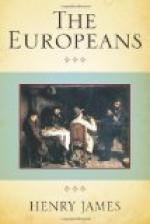She was very frank with him; or at least she intended to be. “I am sure you find it very strange that I should have settled down in this out-of-the-way part of the world!” she said to him three or four weeks after she had installed herself. “I am certain you are wondering about my motives. They are very pure.” The Baroness by this time was an old inhabitant; the best society in Boston had called upon her, and Clifford Wentworth had taken her several times to drive in his buggy.
Robert Acton was seated near her, playing with a fan; there were always several fans lying about her drawing-room, with long ribbons of different colors attached to them, and Acton was always playing with one. “No, I don’t find it at all strange,” he said slowly, smiling. “That a clever woman should turn up in Boston, or its suburbs—that does not require so much explanation. Boston is a very nice place.”
“If you wish to make me contradict you,” said the Baroness, “vous vous y prenez mal. In certain moods there is nothing I am not capable of agreeing to. Boston is a paradise, and we are in the suburbs of Paradise.”
“Just now I am not at all in the suburbs; I am in the place itself,” rejoined Acton, who was lounging a little in his chair. He was, however, not always lounging; and when he was he was not quite so relaxed as he pretended. To a certain extent, he sought refuge from shyness in this appearance of relaxation; and like many persons in the same circumstances he somewhat exaggerated the appearance. Beyond this, the air of being much at his ease was a cover for vigilant observation. He was more than interested in this clever woman, who, whatever he might say, was clever not at all after the Boston fashion; she plunged him into a kind of excitement, held him in vague suspense. He was obliged to admit to himself that he had never yet seen a woman just like this—not even in China. He was ashamed, for inscrutable reasons, of the vivacity of his emotion, and he carried it off, superficially, by taking, still superficially, the humorous view of Madame Munster. It was not at all true that he thought it very natural of her to have made this pious pilgrimage. It might have been said of him in advance that he was too good a Bostonian to regard in the light of an eccentricity the desire of even the remotest alien to visit the New England metropolis. This was an impulse for which, surely, no apology was needed; and Madame Munster was the fortunate possessor of several New England cousins. In fact, however, Madame Munster struck him as out of keeping with her little circle; she was at the best a very agreeable, a gracefully mystifying anomaly. He knew very well that it would not do to address these reflections too crudely to Mr. Wentworth; he would never have remarked to the old gentleman that he wondered what the Baroness was up to. And indeed he had no great desire to share his vague mistrust with any one. There was a personal pleasure in it; the greatest pleasure he had known at least since he had come from China. He would keep the Baroness, for better or worse, to himself; he had a feeling that he deserved to enjoy a monopoly of her, for he was certainly the person who had most adequately gauged her capacity for social intercourse. Before long it became apparent to him that the Baroness was disposed to lay no tax upon such a monopoly.




